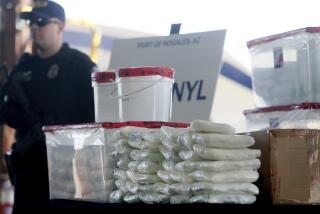U.S. to Seek a Ban on Land Mines
- Share via
WASHINGTON — President Clinton announced Friday that his administration will attempt to negotiate a global ban on possession and use of land mines, but he stopped short of barring the Pentagon from using the weapon until countries like China and Russia cease doing so.
White House Press Secretary Mike McCurry said Washington will introduce a treaty on Monday prohibiting the use, production, stockpiling and sale of antipersonnel mines at the Conference on Disarmament in Geneva.
McCurry said Clinton’s action also makes permanent a ban, originally imposed in 1992, on the sale of U.S. land mines to other countries.
The decision drew immediate criticism from human rights groups, some federal lawmakers and other groups opposed to use of land mines.
There now are an estimated 110 million mines planted around the world, and experts say they kill or maim 25,000 or more civilians every year, often long after the combat in their countries have ended.
The groups favor a Canadian proposal calling for countries to voluntarily cease using land mines and to destroy existing stockpiles.
“This is a missed opportunity,” said Clarice Taylor, spokeswoman for CARE, the international humanitarian agency. “This was an unusual opportunity for the U.S. to show leadership in ridding the world of this menace. We don’t favor a moderate approach to a very immoderate weapon that kills people every day.”
In his decision, Clinton essentially charted a middle course between conflicting views of the State Department and the Pentagon. Defense officials are reluctant to give up the weapon, arguing that it is part of their strategy for defending South Korea and in other potential conflicts.
But the State Department is eager to reduce the toll of deaths and injuries from the devices. Incoming Secretary of State Madeleine Albright has been outspoken in her opposition to land mines and is expected to keep the issue alive.
McCurry said the Geneva conference was selected because the countries attending include Russia, China and others that are major producers of mines; the conference, though, acts by consensus, so every participant, in effect, has a veto.
The Canadians want the United States and other countries to unilaterally end the use of mines immediately and for all nations to sign a draft treaty this year to ban the weapon by the end of the century. But the pact would be binding only on nations that sign it, and the White House believes it would not be endorsed by countries that are the major producers of mines.
“We’re skeptical that the Canadians will succeed in getting wide participation,” said Bob Bell, chief arms control and military policy expert of the National Security Council. “But if we’re wrong and they do persuade China and Russia and other major providers of land mines to come and join that ban, we would be the first to congratulate them and be there with them, joining in that effort.”
John Bell, a spokesman for the Canadian Foreign Ministry, said his government welcomed the U.S. decision to continue its ban on the sale of mines and had no objection to the American approach, seeking action by the Conference on Disarmament. Bell said Canadian officials agree that the two approaches can be complementary but added that Canada will devote its energy to the comprehensive, immediate ban.
Sen. Patrick J. Leahy (D-Vt.), a leader of congressional forces opposed to land mines, said the Canadian plan “is the best opportunity for rapid progress. It establishes a moral and tactical imperative for bringing holdout nations aboard.”
But Bob Bell said the Canadian way is too narrow. If it produces a treaty “that isn’t subscribed to by the major providers of the mines, you’re not going to achieve the humanitarian benefit because you won’t be reducing or eliminating the mines that are causing the problem.”
The United States has begun destroying its entire stock of 3 million of the most troublesome mines--those that remain active until they are triggered, often long after warfare has ended. The Pentagon, however, wants to keep several million “smart” mines, which self-destruct or turn themselves off after a period of time, and, therefore, are less of a hazard to civilians.
Taylor said a CARE worker in Afghanistan was killed just last week by a land mine.
Kempster reported from Washington and Turner from the United Nations.
More to Read
Sign up for Essential California
The most important California stories and recommendations in your inbox every morning.
You may occasionally receive promotional content from the Los Angeles Times.













